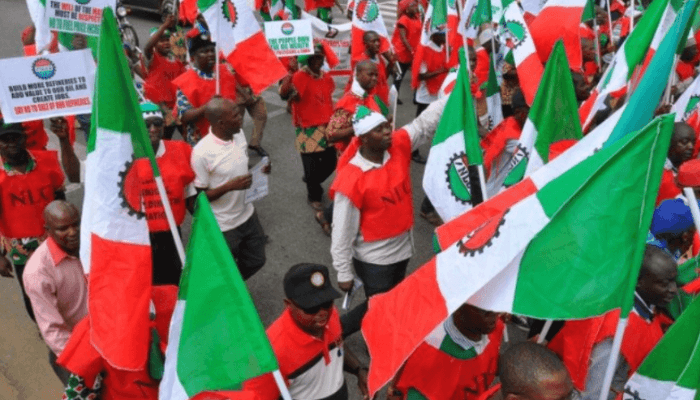The Nigeria Labour Congress (NLC) has issued a list of four key demands in response to the arrest of its president, Joe Ajaero, by operatives of the Department of State Services (DSS).
Ajaero was detained on Monday at Nnamdi Azikiwe International Airport while en route to the United Kingdom for an official assignment, a move that has provoked strong reactions from the union and the wider Nigerian public.
The NLC, one of Nigeria’s largest and most influential trade unions, has condemned the arrest as a blatant violation of the rights of its leader and a deliberate attempt to stifle the union’s activities.

In the wake of the incident, members of the NLC convened several emergency meetings to discuss their response, ultimately releasing a set of demands aimed at addressing not only the immediate situation but also broader economic grievances affecting workers across the nation.
In a post shared on the union’s X handle, the NLC outlined its demands as follows:
1. Immediate and Unconditional Release of NLC President, Comrade Joe Ajaero: The NLC has called for the immediate and unconditional release of its president, insisting that Ajaero’s arrest is unjustified and politically motivated.
The union argues that his detention is an attempt to intimidate labour leaders and suppress the collective voice of Nigerian workers.
The NLC has warned that any delay in releasing Ajaero could escalate tensions and provoke industrial actions across the country.
2. Immediate Implementation of the New National Minimum Wage: The NLC is pressing for the urgent implementation of a new national minimum wage that reflects the current economic realities in Nigeria.
With inflation eroding the purchasing power of workers, the union insists that a revised minimum wage is not only necessary but overdue.
The NLC argues that workers have borne the brunt of the economic downturn, and a new wage structure is essential to provide them with a living income.
The demand for an increased minimum wage is a longstanding issue that has seen numerous negotiations between the government and labour unions, yet little progress has been made, leading to growing frustration among workers.
3. Immediate Reversal of the Price of Petrol: The NLC is also demanding a reversal of the recent increase in the price of petrol, which has had a ripple effect on the cost of goods and services nationwide.
The union contends that the government’s decision to hike fuel prices has further strained the already stretched budgets of ordinary Nigerians, making basic necessities unaffordable for many.
The NLC’s call for a price reversal is part of its broader critique of the government’s economic policies, which it claims disproportionately affect the working class and the poor.
By reducing fuel prices, the NLC believes that there can be a significant reduction in the cost of living and an improvement in the overall economic wellbeing of Nigerians.
4. **Reversal of Illegal Hike in Electricity Tariff**: Finally, the NLC is demanding the reversal of what it describes as an illegal hike in electricity tariffs.
The union argues that the recent increases in electricity costs have compounded the economic hardships faced by Nigerian households and businesses.
The NLC points out that the electricity tariff hike was implemented without adequate stakeholder consultation or consideration of the financial burden it places on consumers.
The union has accused the government of prioritising revenue generation over the welfare of its citizens, and insists that the tariff hike be rolled back to prevent further economic strain on the populace.
These demands by the NLC come at a time of heightened economic and social challenges in Nigeria.
The cost of living has surged, with inflation rates reaching record highs and many Nigerians struggling to make ends meet.
The union’s demands reflect a broader discontent with the government’s handling of the economy and its impact on the daily lives of workers.
The NLC’s stance has garnered widespread support from other labour unions, civil society organisations, and the general public, who view the arrest of Ajaero as part of a wider trend of government overreach and suppression of dissent.
There are growing calls for the government to engage in meaningful dialogue with labour unions to address the issues raised, rather than resorting to heavy-handed tactics.
In response to the NLC’s demands, the government has remained largely silent, but the arrest of Ajaero and the union’s subsequent demands have set the stage for a potential confrontation that could lead to nationwide strikes and protests.
The situation remains tense, and all eyes are now on the government’s next move as the NLC and its allies continue to push for action.
As the country watches closely, the NLC’s demands underscore the urgent need for the Nigerian government to take concrete steps to address the economic grievances of its citizens and to ensure that the rights of labour leaders and workers are respected.
Whether the government will meet these demands or face further unrest remains to be seen, but the NLC has made it clear that it will not back down in its fight for the rights and welfare of Nigerian workers.
Support InfoStride News' Credible Journalism: Only credible journalism can guarantee a fair, accountable and transparent society, including democracy and government. It involves a lot of efforts and money. We need your support. Click here to Donate
